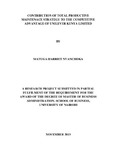| dc.description.abstract | The objective of this study was to establish the contribution of Total Productive Maintenance strategy on Unilever Kenya’s competitive advantage. This research adopted a qualitative research design. Three senior managers (TPM manager, Foods manager and Home & Personal Care manager) at Unilever Kenya Limited were selected as the respondents. The study was a case study and used a semi-structured interview guide as a data collection tool. In order to describe the data, the study adopted qualitative relational content analysis of the variables. The findings revealed that the most significant goal of TPM was to bring world class standards to Unilever. The other goals that became significantly eminent were Unilever taking up TPM to; improve profit margins, improve equipment efficiency and availability, empower the machine operators to carry out autonomous maintenance, improve the quality of products, reduce its environmental footprint and improve safety standards in the factories. In establishing the contributions of TPM to competitive advantage of UKL, the findings indicated that; increased profit margins, reduced accidents in the factory, reduced customer complaints resulting from better quality products, reduced machine breakdown, reduction in maintenance costs and maintenance workforce costs through reduction of overtime labor cost, better planning and scheduling, improved equipment efficiency and availability, employee recognition and empowerment through improved capabilities and competencies, better relationships between operators and maintenance personnel and better competitive edge in global arena were the contributions that Total Productive Maintenance strategy has brought to UKL. The major conclusions indicate that the most significant goals of TPM were to bring world class standards to Unilever. The study recommends that Unilever should continuously implement TPM so as to bring world class value, improve equipment efficiency and availability, empower the machine operators to carry out autonomous maintenance, improve safety and environmental standards in factories, increase profit margin, reduce Unilever's environmental footprint and improve interdepartmental co-operation. Therefore, TPM requires the organization to make plans for funding by top management involvement as well as training. TPM has not been implemented by most manufacturing firms, the study recommends that future researchers should investigate on implementation obstacles. | en_US |

